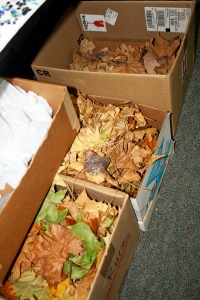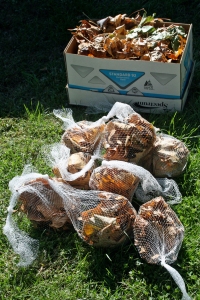On Thursday morning, students in Ms. Martina Ruiz’s fifth-grade class at Needham Elementary School became citizen scientists for a few hours. Their mission: Create eight leaf packs weighing exactly 30 grams each, which will be used to monitor the health of Lodi Lake and the Mokelumne River.
But first, they had to review what they already knew about Lodi’s water.
“Eyes on me,” Ms. Ruiz said, and the students all clapped in unison to show they were paying attention.
Ms. Ruiz and Barbara Transon, GATE instructional coach for Lodi Unified School District, led the students in discussion about how lakes, rivers and other bodies of water can become unhealthy.
Students had some good suggestions:
- Bad bacteria could take over.
- Oil and other chemicals from boats or that gets washed down Lodi’s storm drains could pollute local water.
- Trash, especially plastic, that gets thrown away can harm animals like sea turtles who think it’s food.
The students would be creating and using the leaf packs, then submitting their data to the Leaf Pack Network, to help determine the health of Lodi’s water and learn how to make it healthier.
What is a leaf pack?
In nature, leaves and other plant materials fall into rivers and streams, where they gather against rocks in areas called riffles, and form small clumps, Ms. Transon told the students. Creatures called “macroinvertebrates” — animals like mayflies or craneflies that have no backbones but are big enough to be seen with the naked eye — often life in these clumps of plant matter, or lay their eggs in them.
“The leaf packs are mimicking nature,” Ms. Transon said.
The Leaf Pack Network goes a little more in-depth. In addition to providing a home for macroinvertebrates and other creatures, leaf packs provide food for the creatures that live in them, as well as creating a sort of “watershed tea” that spreads nutrients further down the river.
Why are they important? Macroinvertebrates can offer important clues to the health of a river or other body of water. Some of them struggle when they experience stressors like pollution, and they die off.
Enter the man-made leaf packs, which will be deposited in the Mokelumne River and Lodi Lake for about a month. At the end of that time, the students will pull out the leaf packs and see how many creatures they can find in them, then submit that data to the Leaf Pack Network. More macroinvertebrates — and a wider variety — point to healthier water.
Some of the students had high expectations: “I think the bugs are going to make it their home,” Jairo said. He hoped the bugs might even begin to lay eggs in the packs.
Making the Leaf Packs

On Thursday, though, the students were focused on making the eight leaf packs. They split into groups of four and took turns stuffing leaves into net bags and weighing them. This meant each group had to figure out how to use a handheld postal scale — a tricky task.
“Miguel, you do it, you’re a pro at this,” one member of Group 4 told a classmate. He clipped the scale to the leaf pack and held it up, but it was too heavy.
The other three group members began pulling out leaves one or two at a time until they reached the magic number: 30 grams. “Thirty!” the group yelled in unison.
Once all of the leaf packs were finished and the students returned to the classroom, Ms. Ruiz asked an important question: “Did you guys think about why we’re doing all this?”
After a moment of contemplation, a student raised his hand. “We’re doing this to protect nature,” Jacob said. He explained that human beings rely on nature, and if nature begins to die out, that will hurt humans, too.

He was right, and the leaf pack study will help the students — and scientists who use the data from the Leaf Pack Network — figure out if Lodi is doing enough to protect its lake and river.
And the students could use their newfound knowledge to educate their friends, family members, and Lodi about keeping Lodi Lake and the Mokelumne River healthy.
“It starts with you,” Ms. Ruiz told her class.
Did You Know?
A few interesting facts about water and bugs, courtesy of the fifth-graders of Needham Elementary School:
- Out of all the water on Earth, only three-hundredths of it is fresh water. Humans can only access three-tenths of that fresh water.
- Forensic scientists can use insects’ life cycle to find out how long someone has been dead.